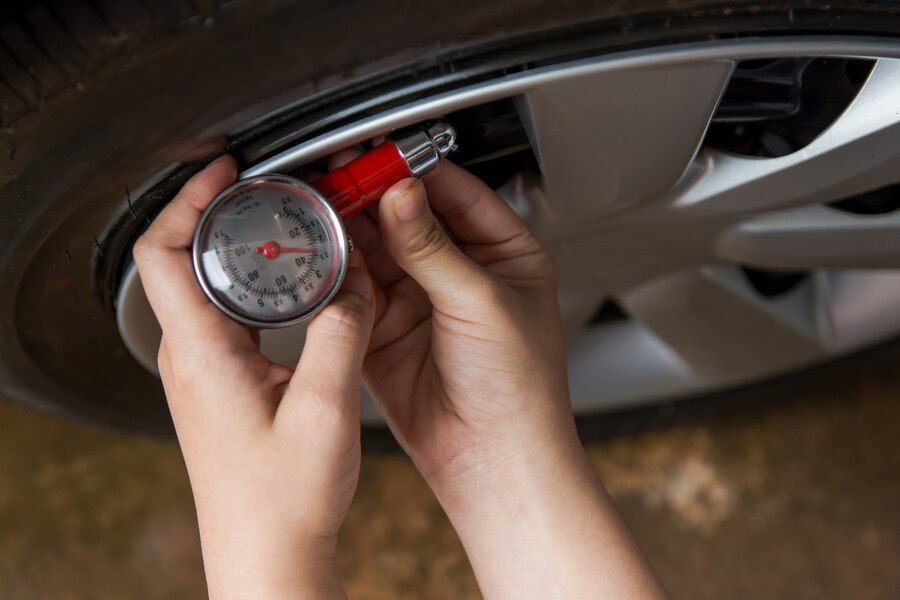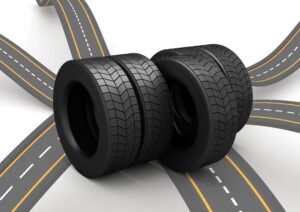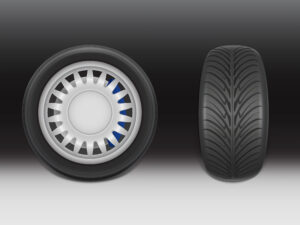The Ultimate Guide to Tyre Pressure Monitoring System for Car: Ensure Safety, Efficiency, and Peace of Mind

Maintaining the correct tyre pressure is a crucial aspect of safe and efficient driving. A Tyre Pressure Monitoring System for Car (TPMS) is designed to alert you to any changes in tyre pressure, helping to prevent accidents, improve fuel efficiency, and extend the life of your tyres. For any driver, understanding how a Car Tyre Pressure Monitoring System works and its benefits can greatly enhance their driving experience. In this comprehensive guide, we’ll explore the workings, benefits, and installation of a TPMS, helping you make an informed choice for your vehicle.
What is a Tyre Pressure Monitoring System (TPMS)?
A Tyre Pressure Monitoring System for Car is an electronic safety system that continuously monitors tyre pressure levels in real-time. When pressure drops or rises outside the recommended range, the system alerts the driver via a dashboard warning or an audible alert, allowing immediate corrective action.
Key Features of TPMS
A TPMS is highly beneficial in ensuring that your vehicle’s tyres are always in optimal condition. TPMS systems are typically categorized into two main types:
- Direct TPMS:
- Utilizes sensors inside each tyre to measure the actual air pressure.
- Provides precise, real-time pressure readings.
- Known for being highly accurate but typically costs more than indirect systems.
- Indirect TPMS:
- Monitors tyre pressure indirectly by measuring wheel rotation speed through the vehicle’s ABS.
- An affordable solution, though less precise compared to direct systems.
Both types are invaluable in helping drivers maintain the right tyre pressure, ensuring enhanced safety and efficiency.
How Does a Tyre Pressure Monitoring System for Car Work?
To appreciate the value of a Tyre Pressure Monitoring System for Car, it’s essential to understand its working principles. The system constantly checks tyre pressure and notifies the driver of any issues. Here’s a breakdown of its functionality:
- Data Collection:
- Direct TPMS sensors inside each tyre monitor air pressure.
- Indirect TPMS systems measure wheel rotation and detect changes due to altered tyre pressure.
- Data Transmission:
- Information gathered by sensors is sent to the vehicle’s central electronic unit.
- In indirect TPMS, data is shared with the ABS, detecting any potential issues based on wheel speed.
- Alerting the Driver:
- When tyre pressure deviates from recommended levels, the system triggers an alert on the dashboard, prompting the driver to inspect or adjust tyre pressure.
Benefits of a Tyre Pressure Monitoring System for Car
Using a Tyre Pressure Monitoring System for Car brings numerous advantages:
- Safety: One of the primary benefits of TPMS is improving road safety. Proper tyre pressure ensures better handling, reduces skidding risks, and minimizes the likelihood of a blowout. A TPMS warns you instantly when pressure drops or rises too much, allowing you to avoid potentially dangerous situations.
- Fuel Efficiency: Tyres at the correct pressure reduce rolling resistance, meaning the engine doesn’t have to work as hard. This leads to better fuel economy, saving you money on fuel in the long run. A Car Tyre Pressure Monitoring System helps you maintain this efficiency without frequent manual checks.
- Extended Tyre Lifespan: Under or over-inflated tyres wear out faster. Keeping tyres at optimal pressure helps them last longer, which means fewer replacements and less waste. A TPMS also makes it easier to detect minor issues before they escalate, preventing premature tyre wear.
- Convenience: A TPMS provides real-time alerts, so you’re always aware of your tyre conditions. This is particularly useful during long drives or harsh weather when manually checking tyre pressure isn’t convenient.
- Environmental Impact: By optimizing fuel efficiency and extending tyre life, a TPMS contributes to a lower carbon footprint. It’s a simple way to drive greener by conserving fuel and reducing tyre waste.
Why a Tyre Pressure Monitoring System for Car is Essential for All Drivers
Adding a Tyre Pressure Monitoring System for Car offers essential benefits to drivers in terms of safety, savings, and convenience. Properly inflated tyres not only provide better traction and stability but also enhance the vehicle’s braking ability, crucial for emergency stops. Additionally, a TPMS is often required by law in some regions, such as the United States and the European Union, adding a layer of compliance for drivers.
Choosing the Right Tyre Pressure Monitoring System for Your Car
When selecting the Best TPMS for Cars, consider factors such as the type of vehicle, your driving habits, and budget. Direct TPMS systems are generally more accurate and suitable for drivers who prioritize precision, while indirect systems are a cost-effective solution for everyday driving.
Key considerations:
- Driving Conditions: Long-distance drivers and off-road enthusiasts might prefer direct TPMS systems for high accuracy.
- Vehicle Compatibility: Some vehicles may already come equipped with a built-in TPMS; check if your car has pre-installed sensors.
- Maintenance: Direct TPMS sensors may require periodic battery changes, while indirect TPMS typically need less maintenance.
Installing and Maintaining Your Tyre Pressure Monitoring System
Installing a Tyre Pressure Monitoring System for Car is straightforward but is best done by professionals to ensure accuracy. Here are some maintenance tips to keep your TPMS functioning well:
- Battery Check: Direct TPMS sensors have small batteries that might need replacement every 5-10 years. Regular battery checks can help ensure your system functions properly.
- Routine Calibration: Have your TPMS calibrated if you replace or rotate tyres. Some indirect systems also require recalibration if tyre pressure is manually adjusted.
- Sensor Care: If you notice the dashboard alert light coming on frequently, it might be a sensor issue. A quick visit to a service center can help diagnose and fix the problem.
Common Issues with Tyre Pressure Monitoring System for Car and How to Solve Them
Using a Tyre Pressure Monitoring System for Car may occasionally bring up issues. Here’s how to resolve some common problems:
- Persistent Warning Light: This might indicate a slow leak or faulty sensor. Check all tyres for punctures or leaks and have faulty sensors replaced if needed.
- Sensor Damage: In some cases, rough terrain or debris can damage TPMS sensors. Regularly inspect sensors and replace any that appear worn or damaged.
- System Errors: If the TPMS alert light remains on even after adjusting tyre pressure, try resetting the system or consult a technician for recalibration.
Conclusion
A Tyre Pressure Monitoring System for Car is an invaluable tool for any driver, providing peace of mind and numerous practical benefits. From reducing the risk of accidents to saving money on fuel and tyre replacements, a TPMS ensures that you’re always aware of your tyres’ condition.
Call to Action
If you’re looking for a reliable and efficient Tyre Pressure Monitoring System for Car installation and maintenance service, contact KwikFix Auto. KwikFix Auto offers a wide range of automotive services tailored to keep your vehicle in top shape. Visit us online, or download the KwikFix Auto app for quick, professional service right to your doorstep!
Frequently Asked Questions
Q1. What is the Tyre Pressure Monitoring System for Car?
A1. It’s a system that monitors and alerts drivers of tyre pressure levels, helping ensure safe and efficient driving.
Q2. Are direct TPMS sensors accurate?
A2. Yes, direct TPMS sensors provide highly accurate readings and are commonly used for precise monitoring.
Q3. Can I install TPMS on an older car?
A3. Yes, aftermarket TPMS options are available for vehicles without built-in systems.
Q4. What should I do if my TPMS alert keeps coming on?
A4. This could indicate a slow leak or sensor issue; inspect tyres and sensors, and consider professional assistance.
Q5. Is a Car Tyre Pressure Monitoring System legally required?
A5. In some regions, TPMS is mandatory for all vehicles.
Q6. Why is monitoring car tyre pressure important?
A6. Maintaining correct tyre pressure enhances safety, fuel efficiency, and tyre life.
Q7. Can TPMS help save on fuel?
A7. Yes, by ensuring optimal tyre pressure, a TPMS helps reduce fuel consumption.
Q8. What’s the best TPMS for cars?
A8. The best system depends on your specific needs; direct TPMS is ideal for accuracy, while indirect TPMS offers affordability.
Related Articles
Car AC Gas Filling Cost | Electric Car Battery Capacity | How Car AC Works | How to Clean Car AC Filter | Car AC Repair Cost | AC Chair Car vs Executive Chair Car | Which Gas is Used in Car AC | Does AC in Car Consume Fuel | Why My Car AC is Not Cooling | Xylo Car Mileage with AC





